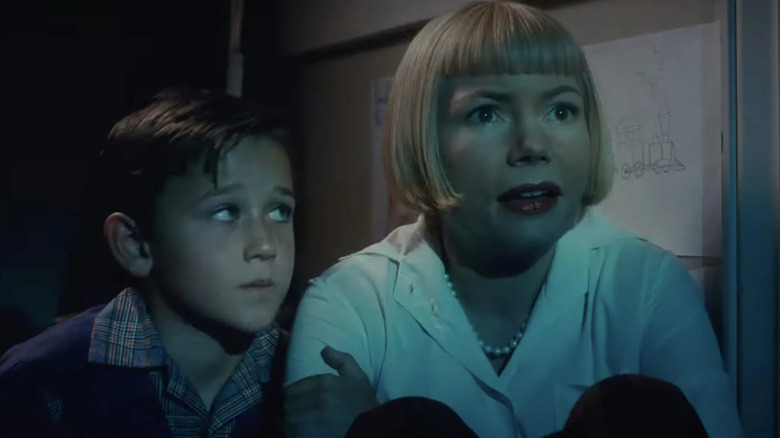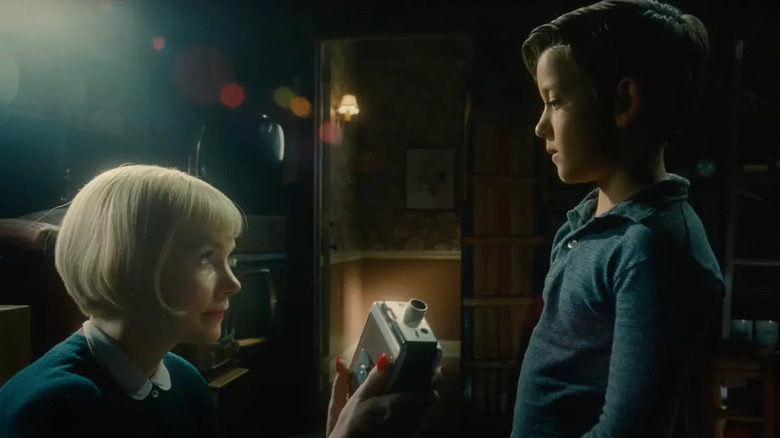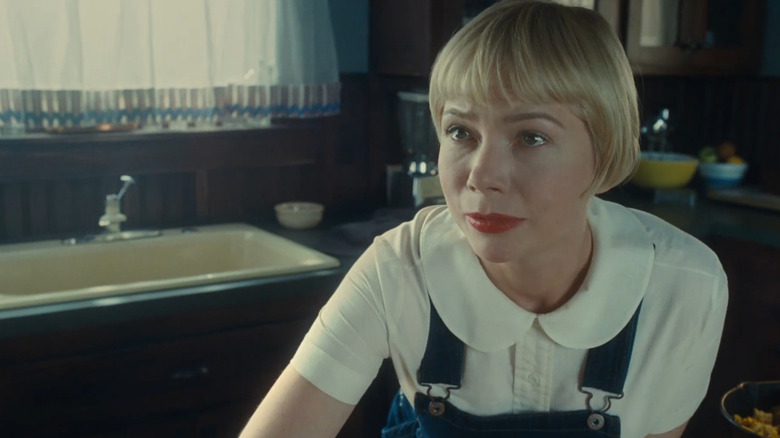How Michelle Williams Prepared To Portray Steven Spielberg's Mother For The Fabelmans
Sam Fabelman (Gabriel LaBelle) may be the protagonist of "The Fabelmans," but his parents Mitzi (Michelle Williams) and Burt (Paul Dano) are just as important. The movie is a roman à clef of director Steven Spielberg's childhood, with Sam representing Steven himself while Williams and Dano's characters are his own late parents, Leah Adler and Arnold Spielberg.
What's most surprising about "The Fabelmans" is that it's one of Spielberg's less sentimental films. The script (written by Spielberg and Tony Kushner) is free of self-aggrandizement and even with the names changed, it's emotionally honest. Critic Roger Ebert called movies "machines that generate empathy" and watching "The Fabelmans," you feel Spielberg is telling this story so he can better understand his parents and what drove them apart.
Casting your own parents probably isn't an easy task; you know them intimately but they're also larger than life. Still, Michelle Williams rose to the challenge of portraying Adler-analogue Mitzi Fabelman.
Who is Mitzi Fabelman?
Speaking to Time while on "The Fabelmans" press tour, Spielberg said, "My mom always referred to herself as Peter Pan, the little girl who never wanted to grow up. She loved being in our lives as our friend more than our mom. She befriended us more than parented us." That's true in the film too, where Mitzi is an eccentric who plays alongside her children and buys a pet monkey on a whim.
While Arnold/Burt was a computer engineer, Leah/Mitzi was a pianist. A filmmaker is both an artist and a technician; Spielberg/Sam inherited the skills of both his parents. Even so, Mitzi nurtures her son's creative side more so than his practical father. While she didn't live to see "The Fabelmans" (passing in 2017), Leah Adler actually encouraged her son to make an auto-biographical movie: "My mom was really kind of pushy about, 'Steve, when are you going to tell our story? When are you going to tell my story?'"
Mother and son become estranged when Sam discovers Mitzi's affair with Burt's friend Bennie (Seth Rogen), while making a home movie for his mom no less. Sam has to keep the adultery a secret, and when Burt decides to hide the truth of the divorce from his children, Sam has to hide his knowledge.
"The Fabelmans" is not a condemnation though. Mitzi is prone to depression and simply happier around Bennie than Burt. There's no bad guy, just two unfortunately incompatible people. Speaking to 60 Minutes, Spielberg admits he blamed the divorce on his father for many years, but if the movie's any indication, he's moved past that.
Williams' acting strategies
Williams spoke about her experience on "The Fabelmans" to Entertainment Weekly, from her acting goals to how she reached them. Unlike her previous experiences playing real people (the interviewer cites Marilyn Monroe in "My Week With Marilyn" and Gwen Verdon in "Fosse/Verdon"), Leah Adler wasn't a public figure. To help Williams paint her picture, Spielberg supplied her with a "dossier" on his mother. Even so, neither actress nor director were looking to make a "documentary." Williams said:
"You're trying to get as close as possible, but I don't think anybody's ever looking for a photocopy of the thing. Otherwise, why make it? It's already been made. To recreate something exactly might not be as interesting as it is to gather the essence and see how that moves you and how that works through these given circumstances."
Williams added that Leah/Mitzi's musical side was what most compelled her when inhabiting her:
"She so completely inhabited the space around her, in front of her, above her, behind her, which feels like the movement of a piece of music. She felt like she was always in motion and she was careening through these ecstatic states from high to low."
The actress also uses "touchstones," such as stored information on an iPad or a journal, to stay connected with her characters and Mitzi was no different. "Every movie that I do," she said,"I always keep a notebook. It's the same notebook, and every woman gets a new one. It's like my little briefcase or something that I take to work with me every day, just a place that I can keep going to and keep connected to."
No matter how different her roles, Williams has found some tried and true methods. The results speak for themselves.


